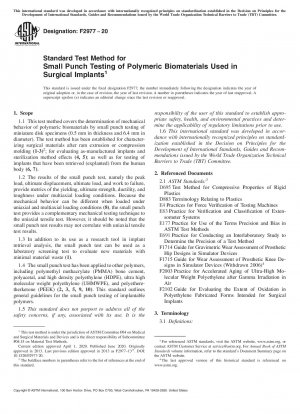ASTM F2977-20
Standard Test Method for Small Punch Testing of Polymeric Biomaterials Used in Surgical Implants
- Standard No.
- ASTM F2977-20
- Release Date
- 2020
- Published By
- American Society for Testing and Materials (ASTM)
- Latest
- ASTM F2977-20
- Scope
- 1.1 This test method covers the determination of mechanical behavior of polymeric biomaterials by small punch testing of miniature disk specimens (0.5 mm in thickness and 6.4 mm in diameter). The test method has been established for characterizing surgical materials after ram extrusion or compression molding (1-3)2 ; for evaluating as-manufactured implants and sterilization method effects (4, 5); as well as for testing of implants that have been retrieved (explanted) from the human body (6, 7). 1.2 The results of the small punch test, namely the peak load, ultimate displacement, ultimate load, and work to failure, provide metrics of the yielding, ultimate strength, ductility, and toughness under multiaxial loading conditions. Because the mechanical behavior can be different when loaded under uniaxial and multiaxial loading conditions (8), the small punch test provides a complementary mechanical testing technique to the uniaxial tensile test. However, it should be noted that the small punch test results may not correlate with uniaxial tensile test results. 1.3 In addition to its use as a research tool in implant retrieval analysis, the small punch test can be used as a laboratory screening test to evaluate new materials with minimal material waste (1). 1.4 The small punch test has been applied to other polymers, including polymethyl methacrylate (PMMA) bone cement, polyacetal, and high density polyethylene (HDPE), ultra high molecular weight polyethylene (UHMWPE), and polyetheretherketone (PEEK) (2, 3, 5, 9, 10). This standard outlines general guidelines for the small punch testing of implantable polymers. 1.5 This standard does not purport to address all of the safety concerns, if any, associated with its use. It is the responsibility of the user of this standard to establish appropriate safety, health, and environmental practices and determine the applicability of regulatory limitations prior to use. 1.6 This international standard was developed in accordance with internationally recognized principles on standardization established in the Decision on Principles for the Development of International Standards, Guides and Recommendations issued by the World Trade Organization Technical Barriers to Trade (TBT) Committee.
ASTM F2977-20 Referenced Document
- ASTM D695 Standard Test Method for Compressive Properties of Rigid Plastics
- ASTM D883 Standard Terminology Relating to Plastics*, 2024-02-01 Update
- ASTM E177 Standard Practice for Use of the Terms Precision and Bias in ASTM Test Methods
- ASTM E4 Standard Practices for Force Verification of Testing Machines
- ASTM E691 Standard Practice for Conducting an Interlaboratory Study to Determine the Precision of a Test Method
- ASTM E83 Standard Practice for Verification and Classification of Extensometer
- ASTM F1714 Standard Guide for Gravimetric Wear Assessment of Prosthetic Hip Designs in Simulator Devices
- ASTM F1715 Standard Guide for Wear Assessment of Prosthetic Knee Designs in Simulator Devices (Withdrawn 2006)
- ASTM F2003 Standard Practice for Accelerated Aging of Ultra-High Molecular Weight Polyethylene After Gamma Irradiation in Air*, 2022-11-15 Update
- ASTM F2102 Standard Guide for Evaluating the Extent of Oxidation in Polyethylene Fabricated Forms Intended for Surgical Implants
ASTM F2977-20 history
- 2020 ASTM F2977-20 Standard Test Method for Small Punch Testing of Polymeric Biomaterials Used in Surgical Implants
- 2013 ASTM F2977-13e1 Standard Test Method for Small Punch Testing of Polymeric Biomaterials Used in Surgical Implants
- 2013 ASTM F2977-13 Standard Test Method for Small Punch Testing of Polymeric Biomaterials Used in Surgical Implants
